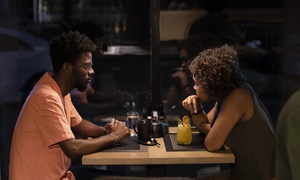<p><br/></p><p>The sun peeked over the rusted zinc roofs of Umudim, its golden light casting shadows that made the village look deceptively peaceful. In a worn-out compound at the edge of the village, Mama Ijeoma stirred from sleep. She lay on a raffia mat on the bare floor, her bones aching from the cold night. The thatch roof above her was torn, letting in the rain that had soaked her clothes and her children’s.</p><p><br/></p><p>Obinna, her sixteen-year-old son, had curled around his sisters to keep them warm. Adaeze, always alert even in sleep, woke first. She rubbed her eyes and looked around. “Mama, there’s nothing to eat again,” she whispered.</p><p><br/></p><p>Mama Ijeoma sighed. “I know, my daughter. Let me see if I can find something.”</p><p><br/></p><p>But she knew the truth—there was nothing left. Not a grain of rice, not even a spoon of garri. The compound was silent except for the groans of hunger from her children’s stomachs. The silence was heavy, broken only by the fluttering wings of a chicken that wandered in, only to leave again—perhaps in search of a better home.</p><p><br/></p><p>By sunrise, Obinna and Adaeze were on the red dirt roads of Umudim. With a worn calabash in hand, they moved from compound to compound.</p><p><br/></p><p>“Aunty Ngozi, please we haven’t eaten in two days,” Adaeze said, her voice low.</p><p><br/></p><p>Ngozi, once a friend of their mother’s, shook her head. “You children again? I told your mother to find work. We’re all struggling.”</p><p><br/></p><p>At another home, a kind old man gave them a few spoons of cassava flour. Obinna thanked him, but Adaeze’s eyes were hard. “Why are we always the ones begging?” she asked.</p><p><br/></p><p>“Because life is not fair,” Obinna said.</p><p><br/></p><p>As they returned home with their small loot, neighbors whispered and pointed. Children mocked them. One boy threw sand at Adaeze.</p><p><br/></p><p>“Beggar pikin!”</p><p><br/></p><p>She turned, tears stinging her eyes, but said nothing. They were no longer seen as children. They were a burden.</p><p><br/></p><p>Chinelo lay curled in a corner of the compound, shivering. Her forehead burned with fever. Obinna tried to cool her with water from the stream, but it only helped for a while.</p><p><br/></p><p>Mama Ijeoma walked to the home of Dibia Okeke, the village herbalist. “My child is dying,” she said, voice trembling.</p><p><br/></p><p>“Bring five hundred naira,” he said, not looking up.</p><p><br/></p><p>“I don’t have it. But I can give you my wrapper.”</p><p><br/></p><p>He stared at her, then took it without a word. She left with a pouch of bitter roots.</p><p><br/></p><p>She boiled the herbs. Chinelo drank and retched, but the fever began to lessen. That night, as fireflies danced in the dark, Mama Ijeoma whispered a prayer to the heavens.</p><p><br/></p><p>At the village stream the next day, Mama Njideka, the oldest woman in Umudim, muttered as the children passed.</p><p><br/></p><p>“The sins of the father... they must reap.”</p><p><br/></p><p>Adaeze heard it and turned. “Mama Njideka, what did you say?”</p><p><br/></p><p>But the old woman only stared into the water.</p><p><br/></p><p>Obinna frowned. “She always talks like that.”</p><p><br/></p><p>Adaeze wasn’t sure. Something in the woman’s eyes haunted her.</p><p><br/></p><p>At the village market, Adaeze stared at a mound of yams. Her stomach screamed. She waited until the trader looked away and reached for one.</p><p><br/></p><p>“Thief!”</p><p><br/></p><p>Hands grabbed her. Traders gathered. She was slapped, kicked, and dragged through the muddy streets.</p><p><br/></p><p>Obinna ran to her, trying to shield her. “Leave her alone!” he cried.</p><p><br/></p><p>They beat him too. It was only after Mama Ijeoma arrived, screaming and crying, that they let the children go.</p><p><br/></p><p>They walked home, covered in bruises. That night, Adaeze didn’t speak. She just stared into the fire.</p><p><br/></p><p>Their home stank. Flies buzzed over the scraps of food, over the pile of broken pots, over Chinelo’s healing body. Neighbors whispered loudly now.</p><p><br/></p><p>“Maybe they are cursed.”</p><p><br/></p><p>Even the church stopped visiting. The pastor once said, “God helps those who help themselves.”</p><p><br/></p><p>Mama Ijeoma wept as she swept their compound. Her tears mixed with the dust.</p><p><br/></p><p>One night, she called her children. “I was not always poor. My father was Obierika—one of the richest men in Umudim.”</p><p><br/></p><p>“What happened?” Obinna asked.</p><p><br/></p><p>“They said he died mysteriously. Then everything changed. We lost our land. People stopped coming to our home.”</p><p><br/></p><p>Adaeze leaned in. “Mama... do you think the curse is real?”</p><p><br/></p><p>She didn’t answer.</p><p><br/></p><p>The Chief’s goat had gone missing. Adaeze was near his compound, carrying a bag. They didn’t ask questions.</p><p><br/></p><p>“Thief!”</p><p><br/></p><p>The guards descended. Fists. Sticks. Blood. They left her broken in the sand.</p><p><br/></p><p>She died that night. Her last words were, “Mama, I didn’t do it.”</p><p><br/></p><p>Mama Ijeoma’s scream shook the village.</p><p><br/></p><p>The next morning, her body lay wrapped in white cloth. Villagers came, but kept a distance.</p><p><br/></p><p>Mama Ijeoma cursed the gods. “Why punish us for what we didn’t do?”</p><p><br/></p><p>Chinelo stopped speaking entirely. Obinna stood by Adaeze’s grave, unmoving.</p><p><br/></p><p>Mama Njideka came that night.</p><p><br/></p><p>“Your father was wicked. He drove people off their lands. He cursed families. He used blood to grow his wealth.”</p><p><br/></p><p>Obinna’s fists clenched. “And now we suffer for it?”</p><p><br/></p><p>“Yes,” she said. “Unless you seek forgiveness.”</p><p><br/></p><p>The curse was clear: Obierika made a pact with Amadioha, the thunder god. But he broke the covenant. The blessing became a curse—one that would travel down his bloodline.</p><p><br/></p><p>Only a journey to Arochukwu could break it.</p><p><br/></p><p>They sold their last possessions. Barefoot, they walked to the sacred shrine in Arochukwu. The priest of Amadioha awaited them.</p><p><br/></p><p>“To break the curse, you must give blood, tears, and a vow,” he said.</p><p><br/></p><p>They slaughtered a goat, cried their pain into a calabash, and Obinna vowed: “I will build a new name for us.”</p><p><br/></p><p>Thunder rumbled. The earth trembled.</p><p><br/></p><p>Rain poured as they left the shrine. It felt like a cleansing.</p><p><br/></p><p>In Umudim, the dry season ended overnight. Crops sprang up. Birds returned.</p><p><br/></p><p>Even their compound felt warmer.</p><p><br/></p><p>Obinna began to earn small money clearing farms. Mama Ijeoma sold her sewn wrappers. Chinelo smiled again.</p><p><br/></p><p>They spoke Adaeze’s name every day.</p><p><br/></p><p>They planted a tree at Adaeze’s grave. A fruit tree.</p><p><br/></p><p>Obinna said, “She didn’t live in vain. We will rise.”</p><p><br/></p><p>As the leaves danced in the wind, Mama Ijeoma whispered, “The shadow has passed. The light is ours now.”</p>






Comments